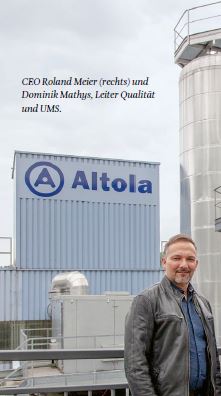"Safety is the top priority here"
Hazardous waste is toxic. A risk for humans and nature! Recycling is therefore subject to strict regulations. Decisive for this business are special technical facilities, a reliable logistics chain as well as a lot of know-how and experience. Altola is at the forefront here.

"Safety is our top priority - for people, the environment and the plants." This is how two "Altolans" define their company's mission in an interview. CEO Roland Meier and Dominik Mathys, Head of Quality and EMS, know their business "à fond". Together they have 54 years of experience at Altola. In this interview, they explain what is being done to live up to this guiding principle in a responsible manner.
What exactly does Altola do?
Roland Meier: Altola has been involved in the recycling, recovery and disposal of hazardous waste for more than fifty years. This is combined with comprehensive advice and collection of hazardous waste from trade, industry and the public sector. Our own processing facilities in Olten and Pieterlen also enable us to accept and treat hazardous waste from abroad. This mainly involves the processing of oils and solvents into substitute fuels for Swiss industry or the acceptance of oil-water mixtures. With around fifty vehicles in operation every day, we are an important partner for our Swiss customers, who entrust us with hazardous waste in very small quantities, via mobile collections in municipalities, through to rail tank wagons. In addition, Altola is a licensed recycling partner for electrical and electronic scrap and operates a plant in Zuchwil for the processing of waste wood. The automotive sector is our largest area. We do not cover hospital waste and explosives. We specialise in liquid waste, which we pass on for final disposal.
And what is the market position?
Roland Meier: There are around 1.6 million tonnes of hazardous waste in Switzerland, including around 600 000 tonnes each of oil separator sludge and contaminated soil. Altola is not active in either of these areas. But in the chemical hazardous waste sector we are the market leader. Our competitive advantage lies in the plant technology and its operation, in pricing and in embedding the whole thing in a logistics concept that is organised on a decentralised basis. Added to this is the many years of know-how of our employees, who can rely on a fully developed infrastructure. Ultimately, know-how and experience give us the edge. In addition, we have digitized a great deal, which also ensures traceability. The document management system does not take up a single linear metre of archive space. And the customers are integrated in the ERP system with webshop.
Altola is certified three times over ... Dominik Mathys: When we decided to obtain SQS certification to ISO 9001 in 1996, we were in a growth phase. We therefore wanted a system that would support us in this direction and at the same time allow us to establish certain guard rails. At the time, this was particularly helpful in the automotive sector. Today, well-documented and lived processes are no less important for customers, employees and other stakeholders. Our management system controls day-to-day business. The periodic review by the SQS erProf auditors enables external input that we do not want to do without. We count on auditors with industry expertise who are able to suggest improvements on the basis of their profound experience. Even the internal preparation of an audit is always a kick with great benefits ...
What is the impact of ISO 14001 (sustainability)?
Dominik Mathys: In 1996, we were the first waste management company in Switzerland to be certified to ISO 14001. The internal and external impact is tangible. Our stakeholders know that Altola has an effective environmental management system. In 2007, for example, we were able to enter into a cooperation with the Solothurn Office for the Environment, which contributes in partnership to the continuous improvement of our environmental impact.
What was the motive for the certification according to ISO 45001 (ASG)?
Dominik Mathys: The diversity and hazard potential of the materials disposed of by Altola make occupational safety and the health of our employees a central concern. Accordingly, risk situations and hazard assessments are carefully sounded out and possible measures defined. This is particularly helpful in the case of new process technologies. The measures are coordinated with the Group and periodically reviewed by means of mutual site inspections. It is not just a question of technical aspects, but also of the "mindset" of all those involved. Progress is noticeable time after time.
Altola has been a member of Eco Swiss, the trade association of the chemical processing industry, since 2000. In 2008, we were certified according to OHSAS 18001, and in 2018 according to the new ISO 45001 standard in order to achieve continuous improvements. The early involvement of employees in decisions and also in risk assessments and evaluations for process optimizations and PPE, which we have maintained since the introduction of the first operational safety systems, is conducive to the acceptance and implementation of measures. Our management system for occupational safety and health protection strengthens the trust of all stakeholders.
Speaking of occupational diseases and stress, we have been spared them to date. This is probably due in no small part to the fact that raising awareness has had an impact. Since colds and flu are a priority at Altola, we offer our employees vaccination campaigns on a voluntary basis. Remarkably, key figures on accidents can also be viewed weekly on the mobile phone.
To what extent does Altola benefit from being embedded in the Vigier Group?
Roland Meier: We feel the commitment of the Group Executive Board very directly "top-down". This generally helps with persuasion, monitoring and the implementation of "learnings". Examples: A Group-wide occupational safety group ensures a regular exchange of experience. A standardised tool for analysing accidents is also being developed. And as part of our health promotion efforts, we are teaming up with Vigier to run a relay in the 100 km race in Biel. A smoking cessation initiative is a permanent feature of the programme.
Where is the future heading?
Roland Meier: Our long-standing team has the ambition to keep Altola in dynamic motion. Whether it's maintenance, sales activities or new technologies, there are corresponding projects underway that we bring into the rolling development planning in the Vigier Group. At the Olten site, for example, we need more space. To increase efficiency, the site is being extended by 5500 m2. The declared aim is to further develop the company along the value chain and to meet customer needs.









